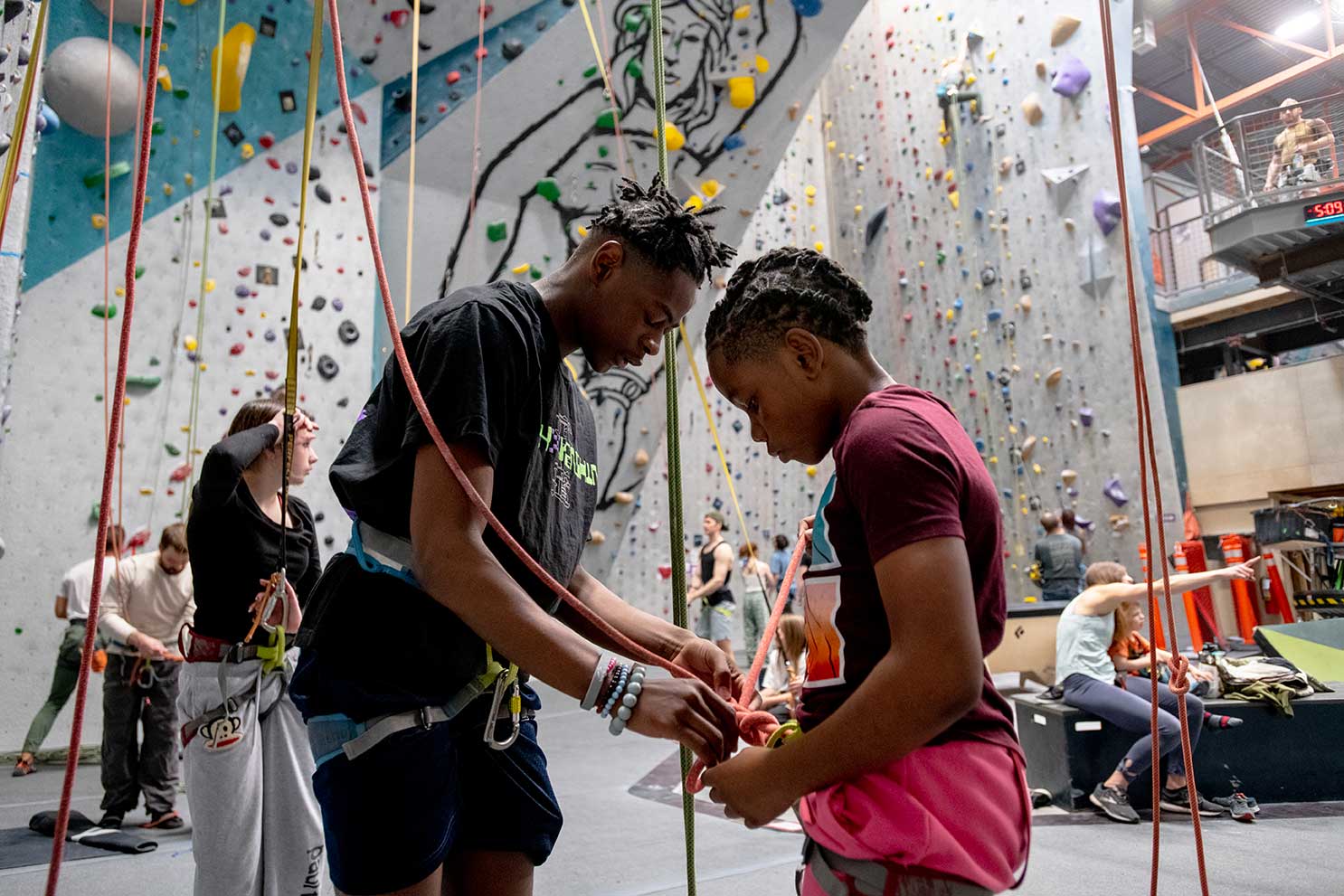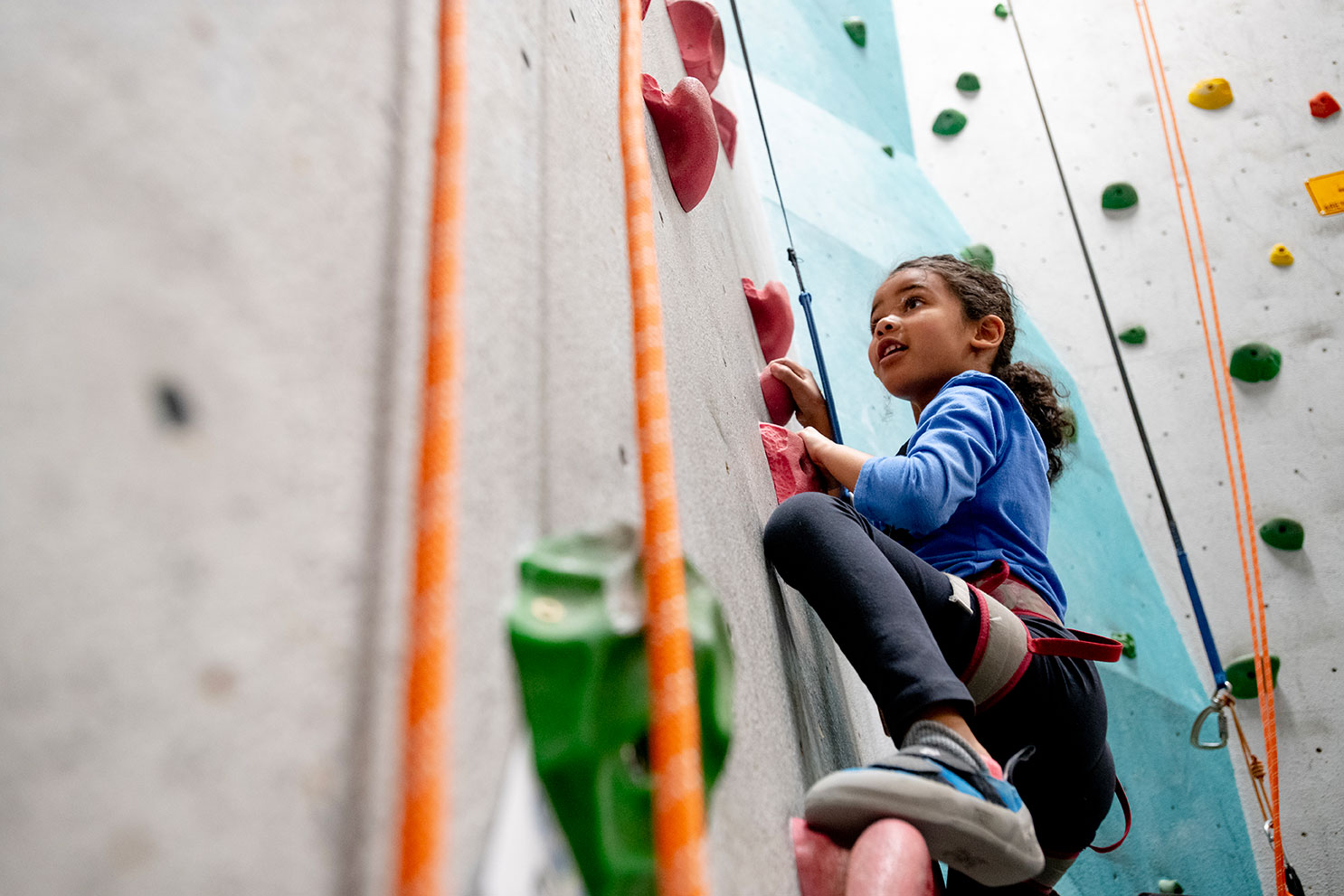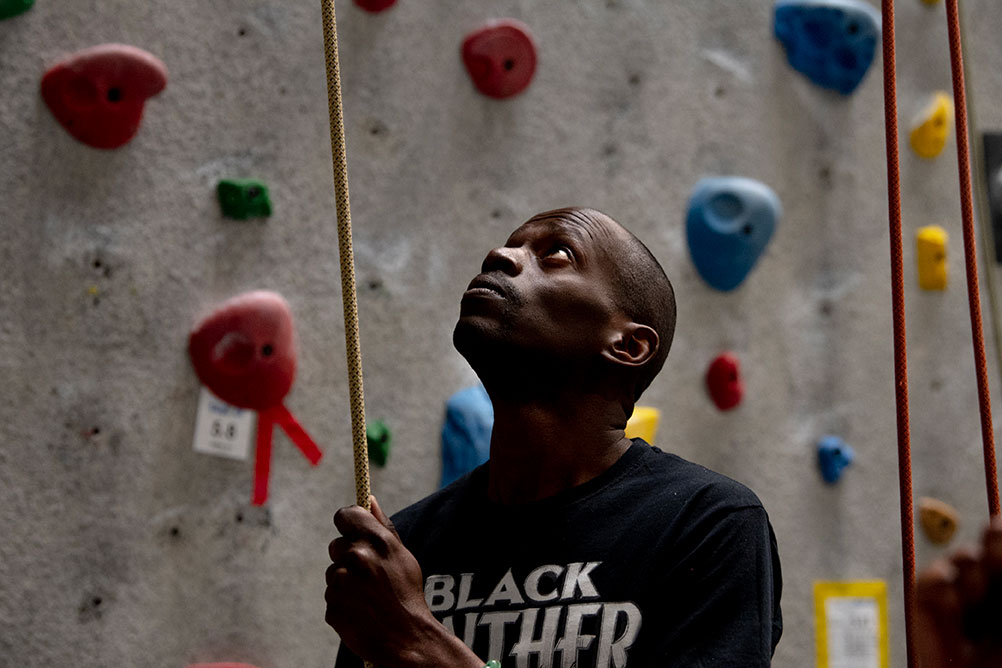
Tiran Charles (l.) assists Ethan Glover with his climbing ropes at the CityROCK climbing gym during a Blackpackers event in Colorado Springs on March 25, 2023. Photos by Parker Seibold / Special to The Colorado Trust
Tiran Charles (l.) assists Ethan Glover with his climbing ropes at the CityROCK climbing gym during a Blackpackers event in Colorado Springs on March 25, 2023. Photos by Parker Seibold / Special to The Colorado Trust
On a Saturday evening in March, Djanne Smith tried rock climbing for the first time on a corner wall of CityROCK climbing gym in Colorado Springs.
“It’s harder than it looks!” she said, before trying again.
Smith drove down from Denver for this, despite a fear of heights, despite not knowing anyone here and despite a density of rock-climbing gyms closer to where she lives. She was here to join an excursion organized by Blackpackers, a Colorado nonprofit that works to expand access to outdoor recreation.
Smith has lived in Colorado her whole life but “there’s a lot of the state I haven’t seen.” She describes herself as the person in her friend group who tries new things, and part of her motivation in trying rock climbing was to inspire other people to join her.
“I’ve always had an interest in outdoorsy activities, but it’s taken me a while to find other people of color to go with me,” said Smith. “For me, it can be intimidating coming into a space where other people don’t look like me. It’s nice when you can be part of a community.”
Patricia Cameron, the founder of Blackpackers, said she was motivated by a similar impulse when she started the organization. After getting divorced in 2012, Cameron wanted to be able to give her young son the same middle-class experiences other families had access to in Colorado Springs. The biggest hurdles came up front—getting gear and gaining the skills needed for backpacking, camping, skiing and other outdoor activities.
After scraping together money from her work as an EMT to buy backpacking gear and teaching herself what she needed to know, Cameron sought to make it easier for others. Blackpackers pays the full cost for people to join skiing, rock climbing, hiking and other excursions, buys gear for newcomers to outdoor recreation, and fosters opportunities for people of color to get jobs in the outdoor-recreation industry. It receives funding and other support from organizations that include Backpacking Light, REI, Arapahoe Basin and the Colorado Health Foundation.
Cameron sees part of her job as changing people’s perceptions of outdoor recreation as something adrenaline-fueled and extreme, or only for people with a particular body type.
“People of color have always been involved in nature,” said Cameron. “It can be going outside and walking the dog. For a lot of people of color, it’s going outside and barbecuing. If you look at it as chasing adrenaline, you’re missing a lot.”
* * *
White Coloradans have a history of gatekeeping access to outdoor space and recreation, sometimes brutally. For decades during Jim Crow, Black Coloradans were denied access to resorts and other amenities catering to white tourists. Swimming pools were off limits, or only available on a single day a week before the pool was cleaned.
At the same time, a legacy of being forced to work outside—during slavery and afterwards—complicated cultural attitudes toward the outdoors within Black communities.
Cameron’s grandmother, for instance, worked picking cotton.
“She saw being outdoors as a tie to poverty and growing up without,” says Cameron. She didn’t understand her granddaughter’s impulse to get outside and get dirty. “My grandmother is still alive, and still concerned.”
But for as long as Black Americans have been excluded from outdoor recreation, they’ve made moves to reclaim it. In Colorado, a resort called Lincoln Hills catered to middle-class African Americans, who sought out community and relaxation at a time when they faced systematic and overt discrimination in cities. A YWCA camp there, Camp Nizhoni, was a place for Black girls to hike, swim and enjoy the mountains. It closed in 1946 after the YWCA integrated another nearby camp, which had previously barred Black girls from attending.
Some of the Blackpackers participants nodded to this history when they talked about why they were at the climbing gym that evening.
“Frankly, I think there’s a lot of trauma passed down culturally,” says Felicia Anzaldua, who lives in Colorado Springs and brought her 6-year-old daughter Zoë to the rock-climbing event. The Blackpackers event brought safety in numbers, Anzaldua said, and an empowering way to gain skills and expertise. “I wanted to expose my daughter [to rock climbing] in a culturally competent way.”

Zoë Anzaldua climbs a wall during the Blackpackers event in Colorado Springs on March 25.
Elizabeth Glover’s five children had been talking about going rock climbing since the last time they attended a Blackpackers event, a month earlier. Glover didn’t participate herself—even if she weren’t pregnant, she said, she wouldn’t be interested—but she brought a van-load of kids to the event, including her own. Her son Ethan clambered easily to the top of the wall, supported by a 15-year-old who had been trained in belaying.
Glover has brought her kids hiking and kayaking since moving to Colorado Springs five years ago—both of those activities “not traditional within African American culture,” she said. “I really believe it’s because of a lack of access historically.”
For Glover, too, the idea of resisting that history is part of the appeal.
“Understanding these social barriers empowers me to help my children overcome them,” she said. That’s good not just for her children, but potentially for other people in their social circle who see them taking on new challenges and are encouraged by them, said Glover. “For me, it’s more of a social responsibility.”
* * *
Today, it’s not overt discrimination that’s the main obstacle for Black Coloradans who want to get outside. Glover said she and her family have felt welcomed in outdoor spaces around Colorado. But that doesn’t mean there aren’t real barriers.
Patience Kabwasa grew up in Utah, and lives in Colorado Springs. She’s always been in close proximity to ski country. But she had never skied.
“It felt so unobtainable in so many ways, not just obviously the price but also the knowledge and the gear and all of those things,” said Kabwasa. “Colorado is full of skiing veterans, so it just feels weird to ask for help from folks who might not understand why you’ve never participated before.”
In February 2021, Kabwasa found the perfect way in. Blackpackers paid for transportation, ski rentals, lessons and lift tickets at Arapahoe Basin for a group of about 30 people—most of whom hadn’t gone skiing before.
“I just really appreciated having that space where I could learn among peers with Blackpackers. It was just an incredible experience,” said Kabwasa. Her kids loved it, too. “Everyone was wiped at the end of the day.”
She went skiing again after that—the next time as a volunteer for another Blackpackers event. “I felt like I gained some muscle memory that was helpful the second time I tried it,” she said.
For all the joy she and her kids experience with Blackpackers, Kabwasa said she sometimes wishes there weren’t a need for it.
“It’s an indication of wealth disparity,” she said. Watching white toddlers race down the ski mountain, she thought about how privilege affords access to opportunities that can translate into good health. “For a family of four, with the gear, the lift tickets, it’s close to $1,000 per trip. That’s at least half of rent. To do that repeatedly throughout the season does speak to privilege.”
What would need to happen for families of color to have the same access to outdoor recreation as white families?
“Economic parity. Full stop,” Kabwasa said. The racial wealth gap in Colorado is vast, as it is everywhere in the U.S., and includes disparities in wages, wealth and homeownership.
“Until then, I think things like Blackpackers help to bridge that disparity,” she said.

Jay Hardy belays for a climber during the Blackpackers event at CityROCK.